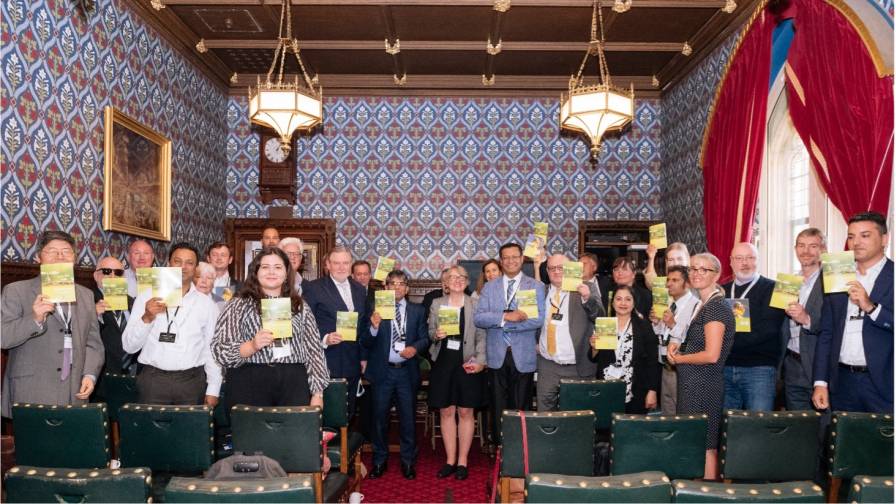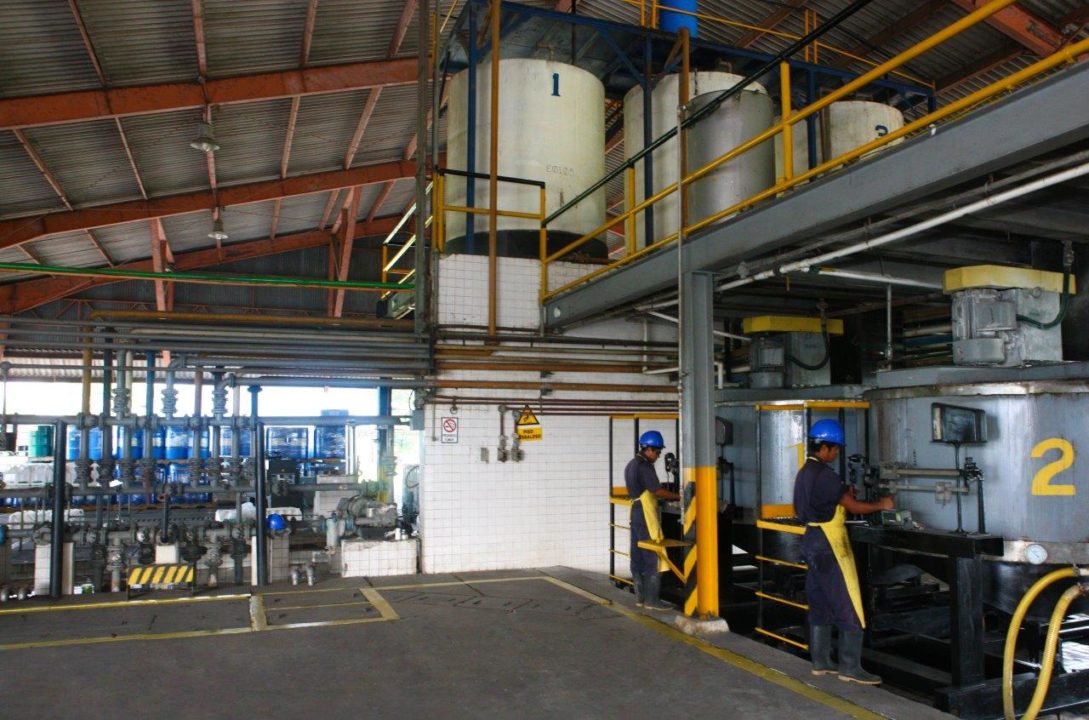WBF Conference Could Be Catalyst for Global Regulatory Reform in Bioprotection

The World BioProtection Forum (WBF) hosted an exclusive conference, Bringing Pesticide Regulatory Reform to UK Parliament, at the Palace of Westminster on 5 September 2023.
Editor’s note: The World BioProtection Forum (WBF) hosted an exclusive conference, Bringing Pesticide Regulatory Reform to UK Parliament, at the Palace of Westminster on 5th September 2023. Attended by Lords, Members Parliament (MPs), policy influencers and industry leaders, it was widely agreed that there is a need for regulatory reforms in the bioprotection sector. As any changes in the UK may resonate throughout the world, this conference could be a catalyst for global reforms, which the industry has been requesting for the past 30 years. An overview of the event is outlined below.
Dr. Minshad Ansari, Founder and Chairman of the WBF welcomed Lords, MPs and Civil Servants and industry experts to the conference, and highlighted the need for biopesticide regulatory reform. Current regulations present a barrier to bioprotectants reaching the market, and are a major contributor to the UK lagging behind other countries (including Spain, Italy, France and Germany) in terms of growers’ uptake of bioprotection. Highlighting recent policy changes in Brazil, Dr Ansari explained how such interventions can markedly impact the uptake of these products, leading to more sustainable, profitable farming, more jobs in the sector, and healthier, safer food for consumers.
Barry Gardiner MP, member of the UK’s Environment, Food and Rural Affairs Committee provided a brief overview of the history of UK agriculture, including the rise of monocultures and intensive farming following World War II. Although these solutions solved the problems of their time – in particular, feeding a rapidly expanding global population – they brought environmental and safety problems of their own, which we are having to deal with now. He outlined the key challenge facing today’s farmers and governments – feeding the world, while preserving the planet.
The RT. HON. Natalie Bennett, The Baroness Bennett of Manor Castle – a long-time supporter of the WBF – picked up the baton to emphasize the need for more sustainable food production, and the role that bioprotectants may play. Citing hundreds of millions of years evolution to balance predators and prey, symbiosis and parasitism, bacteria, fungi, invertebrates and vertebrates, she stressed the need to take agroecological approaches informed by the principles of permaculture.
Developing and using biological products as a replacement for synthetic chemical pesticides is imperative, the Baroness declared, but the current regulatory system that assesses these two very different types of products is both nonsensical and counterproductive. The Baroness pointed out that this is an area in which the UK could take a global lead in improving food security and starting to restore our natural world.
Nick Mole, Policy Officer at the Pesticides Action Network (PAN), echoed these comments, listing a number of chemical pesticides that are known to have caused harm and have been banned from use. However, without these products, farmers will not be able to protect their crops, unless sustainable alternatives can be brought to market to replace them.
“For every banned chemical pesticide, it should be possible to discover or develop a biological alternative,” Barry Gardiner MP stated.
These are the challenges of the 21st century – to feed the world while addressing the devasting effects that the past century’s agricultural practices have had on our fragile planet. Today’s farmers need new solutions, and biopesticides can be part of the answer, but the legislative environment for these products must enable more of them to reach the market.
The 50 delegates invited to attend this exclusive WBF conference, Bringing Pesticide Regulatory Reform to UK Parliament, were ready to discuss and debate the role of bioprotection in providing a solution, and how to overcome the regulatory obstacles that have been holding back the sector for the past 30 years.
Where is the science?
Carol Pullen, President of the WBF, shared an anecdote from her own family’s firm, Oro Agri, which was unable to market its orange oil product, an all-in-one insecticide, fungicide and acaricide for crop protection, in the UK due to restrictive regulations. Although effective globally, the product could only be launched in southern Europe, where the authorities accepted data from trials performed across a range of world regions. In norther Europe, including the UK, the authorities wanted more trials (12 in total) performed in their region. The costs associated with performing dozens of trials, in every world region where this product might be launched, were prohibitive to market entry, so product launches were only possible in those countries that accepted data from a spread of climactic regions. The scientific rationale for demanding dozens of trials in each climactic region is not clear.
In fact, as Dr. Mark Whittaker, Managing Director of APIS Regulatory Ltd., explained, there is little science behind current regulations for biopesticides.
“These regulations are not based on science,” he declared. “Three quarters of the data requested by the authorities for biopesticides are scientifically meaningless from a risk assessment perspective.”
Dr. Whittaker went on to provide a list of examples of data requirements which – it cannot be denied – were highly entertaining, but deeply worrying! Why, for example, are microbes being tested for ecotoxicity against earthworms and Collembola, both of which feed on microbes in nature? It is not uncommon, Dr Whittaker explained, for the test group to fare much better than the control group in these tests.
“All we are doing is feeding them!” Dr. Whittaker exclaimed.
On the other hand, a number of tests against honeybees and other pollinators are poorly designed, as they test for acute toxicity rather than the completely inverse situation seen with biopesticides. For example, the required 2-day toxicity tests against wasps are insufficient to detect any potential effects of microbial biopesticides, which would take at least 5 days to cause harm. Even more worryingly, tests against honeybees are performed only on adult bees, while microbes would most likely affect the larvae. As a result, current tests for ecotoxicity of biopesticides are insufficient to protect our beneficial insects.
These and other examples of inappropriate data requirements for new biopesticides stem from the fact that their approvals process was added “as an afterthought” to existing synthetic chemical regulations in the 1980s. In order to remedy this historical error, regulators need to recognize that biopesticides are completely different entities to synthetic pesticides, requiring their own legislative category based on appropriate risk assessments.
The true cost of legislative failure
The current regulatory system, inappropriately based on risk assessments for synthetic chemicals, is not only costly in terms of regulator fees and data generation – the time taken for the authorities to review and approve new biopesticides is having a direct impact on companies’ investment prospects, liquidity and ability to retain staff. In fact, as Robert Cannings, Head of Agri Sciences Biologicals, explained to the politicians in the audience, current regulations have a direct impact on jobs in the UK, and are driving companies overseas.
Cannings cited an example from his own company, which registered a plant extract in 1995 that was not approved until 2003. During those 8 years, the company had no revenue from this product, which means it could not attract investors, and was forced to lay off staff. Those highly-skilled workers went abroad, contributing to the UK’s national brain-drain.
In another example, Cannings registered two products in the EU/UK and the USA at the same time. The EU/UK registration cost £6 million (including studies) and there was no revenue from these products for over 5 years, while he awaited approval. In the US, registration cost only US$2 million and approvals were achieved within 3 years. One of these products is now worth over $200 million globally. The difference between the US and UK systems means that competitiveness in the UK falls far short of what might be expected in a country in which the government claims to be supportive of green tech.
This lack of competitiveness in the UK – which comes as a direct result of obstructive and inappropriate regulations for biopesticides – is also driving companies out of the country. Added to the brain drain noted above, entire companies are registering outside of the UK to benefit from more appropriate regulations, better tax incentives and more governmental support. Canning’s own company is now registered in the Netherlands instead of the UK, for precisely these reasons.
Meanwhile, Thorben Looje, Director of Valto, is moving operations from The Netherlands to Canada, where regulations are more straightforward and he has “more space” to develop more products.
“Growers need more products, but we are blocked by regulation in Europe,” Looje explained.
Indeed, farmers do need more products. They are suffering from reduced tools with which to protect their crops, as a growing number of synthetic pesticides are banned due to their toxicity. Yet a slow and cumbersome regulatory system is delaying and/or preventing the availability of sustainable biological alternatives. This means that the current regulatory system is further impacting farmers’ yields, which in turn impacts their ability to provide employment for local farmworkers, while more farmers than ever are leaving the industry, as it becomes just too difficult to retain profits.
Concerns over having fewer jobs in synthetic chemical companies as a result of a more successful bioprotection sector were considered unfounded, as most synthetic chemicals are now manufactured in Asia, while the UK has a strong bioprotection sector ready to contribute directly to the economy. Distributors and other supply chain staff currently working on synthetic chemicals can easily shift their focus, if needed, without the loss of jobs.
In summary, the current regulatory system is having a direct impact on the UK’s economy, its competitiveness, the ability to farm, and to provide jobs. Better support for the bioprotection industry, including better regulations, would go a long way to addressing these issues.
Proposals for a better system
As stated by Gardiner, “We all agree that regulatory reform needs to be appropriate,” and it was clear by this stage in the conference that regulations for biopesticides need to be reformed.
Tristan Jervis, Senior Public Affairs Director for the WBF, explained that the WBF launched a White Paper entitled Creating the World’s Best-in-Class Biopesticide/Bioprotectant Regulatory System at the end of 2022. This document included 26 recommendations for regulatory reform, including the issues outlined by Dr Whittaker. These recommendations would enable the UK to create a regulatory framework that provides a robust risk assessment while supporting green innovation and enabling more biological solutions to get to market.
Since current problems stem from the fact that data requirements for bioprotection products continue to be based around requirements for chemical pesticides, the most crucial advice offered to the UK Government would be to separate the regulatory routes for synthetic pesticides and biopesticides. This will allow the Health and Safety Executive (HSE) to reconsider the types of risk assessment data being requested for bioprotectants, with the goal of providing more appropriate tests for biologicals that offer a better assessment of their risk.
Speaking after the event with The Rt. Hon, George Eustice MP, Former Secretary of State for the Department of Environment, Food and Rural Affairs (DEFRA), Dr Sarah Harding, Communications Advisor to the WBF and co-author of the WBF’s White Paper, Creating the World’s Best-in-Class Biopesticide/Bioprotectant Regulatory System, stressed that the UK Government must not take the “easy route” of simply creating a low-risk category for biopesticides under the current system. This would still trap biopesticides in a process designed for the risk assessment of synthetic chemicals, which are entirely unsuited to the products in question. It is vital that the UK Government takes this once-in-a-generation opportunity to separate biopesticides into their own regulatory category, and to develop separate data requirements that are fit for purpose.
Taking a global lead in the UK
As explained by Dr. Owen Jones, Managing Director and Partner at Lisk & Jones Consultants, the UK is in a prime position to make these changes right now, following the Government’s commitment in 2021 to revise regulations post-Brexit that do not benefit UK citizens and businesses.
“This is an opportunity to plough our own furrow,” said Jones. “And the UK has the reputation for doing the right job, so we could be the shining light in how to do this.”
“The UK has an opportunity to change a system that does not fit biologicals,” added Looje, Director of Valto, currently based in the Netherlands. “If you do it, the EU will see that it is possible, and if they don’t change things too then companies will all move to the UK.”
Richard Glass, Innovation Sector Lead at Crop Health and Protection (CHAP) also thought that regulatory reform and better governmental support would encourage more businesses to stay in the UK, and to expand in the UK.
“We just need to get over this hurdle,” Glass concluded. “The demand for biopesticides is there.”
The panel agreed that regulatory reform for biopesticides in the UK could attract more bioprotection companies to register their companies here, directly impacting the UK economy and jobs. There was a strong belief that industry pressure from the Unions in the EU would also ensure that the European Commission would be persuaded to consider similar reforms.
Citing Brazil as a recent success story, Owen highlighted the dramatic change in the biopesticide market since the South American country amended its own regulations for biopesticides in 2022. As well as providing a more appropriate regulatory framework, Brazil offered incentives to farmers to try biological alternatives, and grants for businesses developing these products. Owen noted that perhaps the cleverest step the Brazilians had taken, however, was an investment in education, so there is now a raft of young highly skilled technicians who can explain to farmers how to use these products.
Mole, Policy Officer at PAN, agreed that this was an enlightened move on the part of the Brazilian government. He highlighted the fact that few UK farmers choose their own crop protection products – most rely on their agronomists, the majority of whom are ultimately employed by, or linked to, synthetic chemical companies or distributors. An independent agronomist service in the UK, incentivized to provide autonomous advice on sustainable farming, including the use of biopesticides where appropriate, would reduce UK farmers’ reliance on synthetic chemicals and help move the country to more sustainable food production.
Glass, Innovation Sector Lead at CHAP, added that as chemical resistance spreads, reducing the effectiveness of synthetic pesticides, he and his colleagues at CHAP are seeing greater interest among growers for biological alternatives, especially in the food production sector.
“We see an opportunity for biologicals in the food production sector,” Glass said. “To maintain profitable yields while producing safer food and reduced contamination.”
What’s next?
It may be considered a success that the Lords, government ministers and top policy influencers attending the WBF Conference on 5th September 2023 all recognized and agreed that regulatory reform for biopesticides is required.
However, our job is not yet complete.
We expect the UK Government to include this matter in its next National Action Plan (NAP), which will be published in October 2023. The NAP is an official policy document that articulates the government’s priorities and actions for the next year, so it is a triumph for the WBF and its members that this has been achieved. However, there is still work to be done to ensure the right reforms are made.
This could be the last chance for a competent authority to “get it right”.
That means this could be the bioprotection sector’s last chance to influence global regulatory reforms – starting with the UK – in a meaningful way.
The frustrating thing is, it seems like a “no brainer”. Everyone wins, don’t they?
- Bioprotection companies win because they can develop and launch more products, which make them more profitable.
- Local communities win because those companies will provide highly-skilled jobs.
- Farmers win because they will get more effective products to protect their crops, which in turn will add to profitability and create even more jobs.
- Politicians win because as those companies and farmers create jobs and contribute more to the economy, they can upskill and level-up the national workforce.
- Consumers win because they will have access to healthier, safer, residue-free foods.
- The UK government wins because it can stake its claim as a world leader in this green technology.
So why are we still worried?
Our main concern is that the UK government, having accepted the need for reform, is going to take the ‘easy path’ of simply creating a new ‘low risk’ category within the current system. This is not good enough – it just plasters over the cracks, and will only lead to continued demands for reform for another 30 years.
The current data requirements are inappropriate for biologicals, and sensible, proper changes are needed to create a more appropriate and robust risk assessment process. It is imperative that the UK makes real and meaningful changes, such as those listed in the WBF’s 2022 White Paper, Creating the World’s Best-in-Class Biopesticide/ Bioprotectant Regulatory System.
The World Bioprotection Forum has poured funds and resources into this effort, with support from a select group of enlightened companies. The latest conference, Bringing Pesticide Regulatory Reform to UK Parliament, at the Palace of Westminster on 5th September 2023, was sponsored by Bionema, NPP (part of UPL) and Rovensa. The WBF thanks these companies for their kind support.
In his concluding remarks, Dr. Ansari thanked the WBF team, including Meraj Syeda, Shachi Gurumayum, G. Nuree, Tristan Jervis and Dr. Sarah Harding, the sponsors, and attending Peers, MPs, policy makers and industry experts. He also appealed for industry support for the final leg.
Anyone who wants to see regulatory reform for biologicals should be getting behind this campaign. Help the WBF, to help the bioprotection industry and our future. Visit the World Bioprotection Forum website to become a member or simply donate to the campaign.






